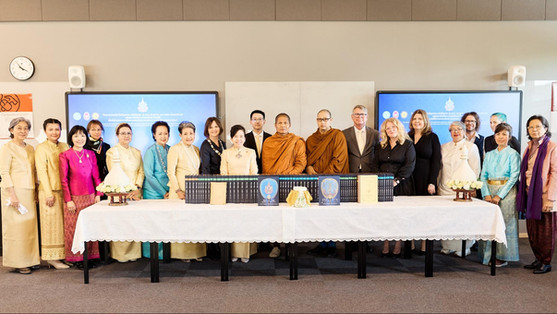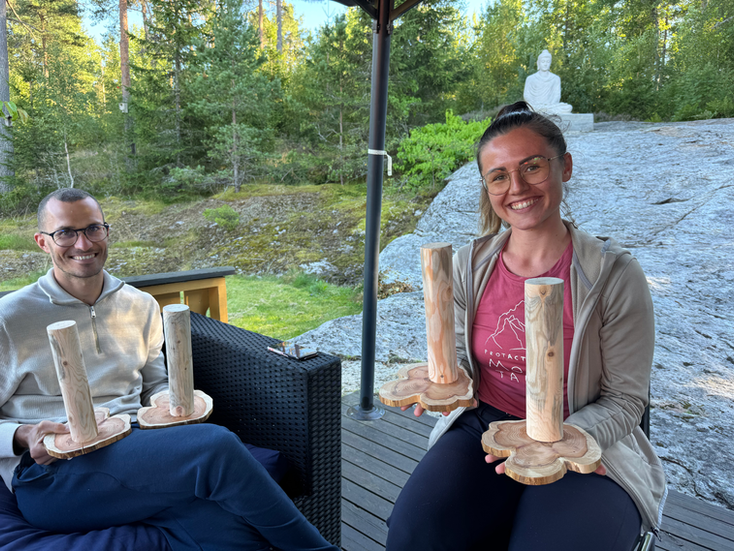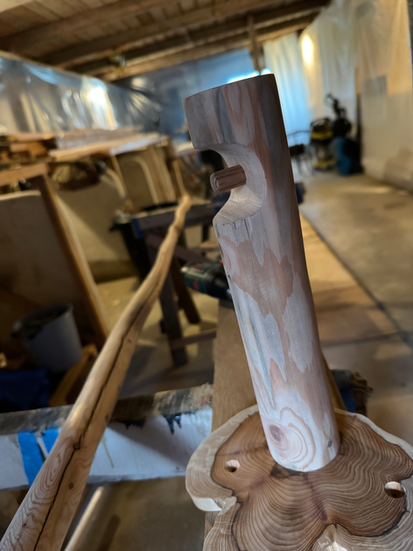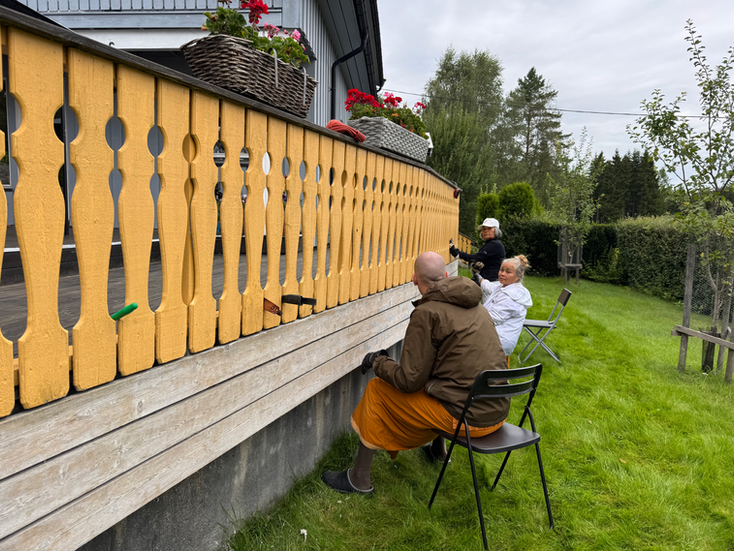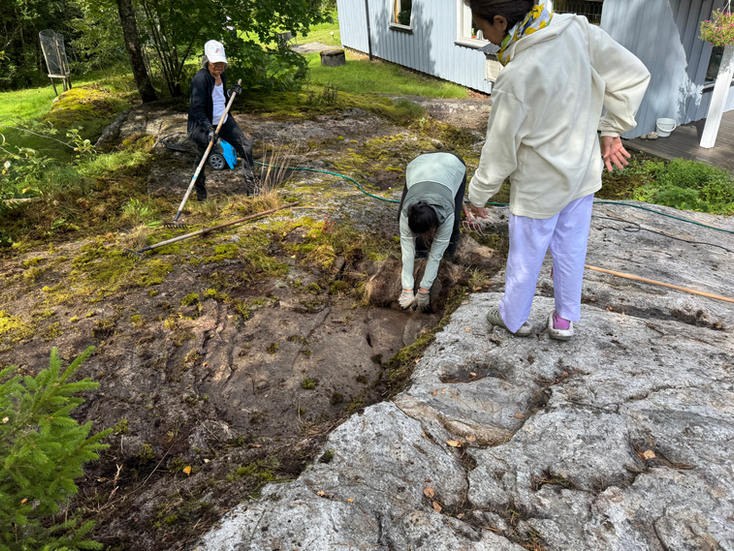Newsletter – August 2025
- web91481
- Aug 31, 2025
- 8 min read
Updated: Sep 22, 2025
The new moon of August, which fell on Saturday, the 23rd of August 2025, marks the halfway point of the vassa. This means there are about six weeks left until Pavāraṇā Day, the full moon of October, which concludes the rains-retreat. Even in monastic life, it is striking how quickly time seems to pass. Let’s now take a look at the recent events which took place at Skiptvet Buddhist Monastery.
Recent events
The World Tipitaka Foundation
From 6th to 11th May, we were honoured to host the World Tipitaka Foundation, led by Thanpuying Varaporn Pramoj, in Skiptvet. The visit culminated in the donation of the Sajjhāya Recitation Tipiṭaka Queen Sirikit Edition (Pāli Transcription Notation) to the University of Oslo Library on 7th May. During their stay, they gave a wonderful explanation of this edition of the Tipitaka, and we even had a chance to practise reading the unique notations with them.
Ajahn Karuniko
From 27th to 30th May, Ajahn Karuniko—the former abbot of Cittaviveka in England—visited Skiptvet for the first time. His visit followed a retreat he led in Sweden with Tahn Anejo and Tahn Titthanyano.

Dāna food stall
This year, on 1 June, the monastery's supporters set up a dāna food stall for the first time on Skiptvet village day. We introduced the villagers to Pad Thai and sweet sticky rice and mango. Despite the rainy weather, the atmosphere was warm and welcoming, thanks to the help and encouragement that passed from the older to the younger generation of supporters.
Luang Por Pasanno
From the 8th to the 14th of June, we were delighted to have the presence of Luang Por Pasanno, the second-most senior disciple of Ajahn Chah. Luang Por expressed appreciation for our forest, saying that it reminded him of his childhood in Canada. We have uploaded the talk that Luang Por gave during this visit, which can be found here (more on talks below.)

Ajahn Khemasiri — Summer retreat
Then, from the 17th to the 29 of June, Ajahn Khemasiri, the previous abbot of Dhammapala in Switzerland, led our annual 9-days silent meditation retreat, which was attended by twenty people or so. Participants camp in the forest for the duration of the retreat, and follow a regimen of sitting and walking meditation throughout the day. Participants expressed appreciation for Ajahn Khemasiri's teachings, is gentle demeanour, and his infectious sense of humour. We are grateful that the Ajahn accepted our invitation to lead the retreat this year. If you are interested in participating in this retreat next year, please watch this space (or subscribe to our newsletter by using the form at the bottom of the homepage); we will post more information about it in early 2026.

Arrivals for the vassa
Tahn Adicco arrived to attend Ajahn Khemasiri's summer retreat and is staying with us for the Vassa. Ajahn Gambhīro also arrived just before the Vassa commenced.
Thai language retreat —Amaravati
Ajahn Kongrit led a five-day Thai-language retreat at Amaravati, England, from 25th to 30th July. Recordings from the retreat are available here. A highlight for the participants was being able to attend the meal offering ceremonies for the 75th birthday of Luang Por Pasanno on 26th July and the 91st birthday of Luang Por Sumedho on 27th July.
The Rains-Retreat (Vassa)
This year, vassa began on 10th July. We celebrated our Āsāḷha Pūjā and Start of the vassa on Sunday, 13th July. During the ceremony, Ajahn Gambhiro and Ajahn Kongrit offered talks, recordings of which can be found here. We also redecorated the chedi with a new cloth.
Following the start of the Vassa, the Sangha went to formally pay respects to Luang Por at Wat Thai Norway. They later did the same for Ajahn Vikran at Wat Santinivas in Rygge.
Letting go as liberation of the mind
Ajahn Gambhiro
SN 46.54 teaches us about the boundaries which the brahmavihāras are letting go as liberation of the mind (cetovimutti), and the qualities they culminate in:
A heart with mettā is beautiful, a heart with karuṇā has infinite space to include everything, a heart with muditā doesn’t draw back with making the boundary, “this I will not be conscious of”, and a heart with upekkhā is unshakable, it has nothing which can make disturbing impressions on it.
Awareness-release through goodwill (mettā) has the beautiful as its excellence…Awareness-release through compassion (karuṇā) has the sphere of the infinitude of space as its excellence…Awareness-release through empathetic joy (muditā) has the sphere of the infinitude of consciousness as its excellenceAwareness-release through equanimity (upekkhā) has the sphere of nothingness as its excellence…
When we are practising muditā, we can listen to Ven. Sāriputta’s advice in AN 5.162 to focus the mind on what someone is good and skilful at. Just like a very thirsty traveller would appreciate even the little water found in a cow’s footprint.
Just as when there is a little puddle in a cow’s footprint, and a person comes along, burning with heat, covered with sweat, exhausted, trembling, & thirsty. The thought would occur to him, ‘Here is this little puddle in a cow’s footprint. If I tried to drink the water using my hand or cup, I would disturb it, stir it up, & make it unfit to drink. What if I were to get down on all fours and slurp it up like a cow, and then go on my way?’
Activities at the monastery
More recently, Ajahn Kongrit has been busy in the workshop, skilfully crafting two beautiful robe rails for the monks’ kutis 2 and 3. A short-term guest with extensive woodworking experience kindly assisted with the final touches and installation.
Ajahn Gambhiro continues to offer weekly Pāli classes to monastics, taught from Norway but attended online from as far away as North America.
The bhikkhus have also been taking turns on two-week solitary retreats. During these periods, they step back from community life and refrain from attending pujas and the meal blessings in order to deepen their practice. If you see a monk waiting quietly outside during the meal, or inside but with his bowl strapped around his shoulder, it is likely he is on retreat and observing noble silence.
Weekend Meditation Retreat
A Thai-language meditation retreat was held at the monastery from the 8th to the 10th of August. A total of 11 people from Switzerland, Germany, and Norway attended, which was a perfect number for our guest accommodation. Although some participants did not understand the language, they were keen to join for the meditative atmosphere.
The program included translated chanting (Pali-Thai) and meditation instruction. To ensure all participants benefited to the fullest, some sitting meditation sessions were also led in French , and key points were summarized in English.
Both before and after the formal sessions, the attendees helped develop the monastery by cleaning the stone courtyard, cutting grass, and going on hikes together. This fostered a wonderful sense of friendship among everyone.
English-language mindfulness retreat —Wat Thai Norway
On the 23rd and 24th of August, Ajahn Kongrit was invited by Wat Thai Norway—the main hub for Thai Sanghas in Northern Europe—to lead its first-ever official English-language mindfulness retreat. While not a full residential retreat (participants went home in the evenings), it was a valuable opportunity to connect with a new community, share some Dhamma teachings, and introduce them to our chanting in Pali and English. A selection of photos from the event are available here.

Alms-round and meal offerings
The monks continue their bi-weekly alms rounds in Sarpsborg and Fredrikstad, and we are thankful to the Thai restaurants Khao Thai, Vitee Thai, and Royal Thai Take Away for their ongoing support and renewed invitations. Tan Adicco has also been walking for alms to Skiptvet recently—hoping to do so on a more regular basis – and was pleased to come back with food in his bowl, generously offered by the locals.
If you would like to support the monastery by bringing a full meal, or cooking it in the monastery’s kitchen, please let us know by filling this form, so that we can book this in our kitchen calendar. With no postulants (anagārikas) at present, we are entirely reliant on the generosity of guests and visitors, as bhikkhus are not allowed to cook or help themselves to food stored in the main house.
Audio recordings: Dhamma talks and chanting
We have begun uploading some of our Dhamma talks to this Google Drive folder, so please add this to your bookmarks if you wish to download our recent talks. We will also be gradually uploading recordings of our chanting here. If you wish to follow along at home, and practice your chanting, you can download the PDF files of Volume 1 and Volume 2 of the chanting books used here, and in other Western Ajahn Chah monasteries.
Upcoming events
Dugnad
Our annual dugnad (work day) will take place on Sunday, the 7th of September, and everyone is warmly welcome to join for part or all of the day.
Pay respect to the senior monk—Ubolmanee, Grimo
Then, from the 22nd to the 28th of September, the three bhikkhus will visit Luang Por Khampong at Wat Ubolmanee near Bergen, as a way of paying respect to our elder (which is otherwise called “samici-kamma” and is typically done during the vassa.)
Robe-offering ceremony—Kathina season
Finally, our Pha Pah, the robe-offering ceremony of the Kathina season, is scheduled for Sunday, the 12nd of October. See this post for more information. Please note that our community of three monks is too small to hold a full Kathina ceremony, which requires at least five bhikkhus to have spent the vassa together. For this reason, we hold what is referred to as a “Pha Pah” during the Kathina season instead.
Follow the knowing or feeling?
Ajahn Kongrit
When we contact things, our knowing element leads feelings to arise. We like what we find agreeable and dislike what we don't. This seems normal, so it becomes a habit we stop paying attention to. We just act on those we like and dislike.
While this may seem like a trivial matter, it’s this very force that has been pushing and pulling us our entire lives, making us chase after things or run away from them, all in proportion to how much we hold onto them in our minds. The mental process of an ordinary, untrained person is not so different, regardless of their education, career, social status, gender, or age. If actions driven by these impulses are not controlled or restrained within a socially acceptable limit, they can become unseemly, undignified, and even embarrassing or repulsive.
Knowing how to control and restrain our actions of body and speech within a proper framework is key. Even if our mind still thinks and desires to act on those impulses, the damage does not affect society or other people. The more we restrain and discipline our minds, the less these impulses cause distress to ourselves.
“Ātāpī sampajāno satimā, Vineyya loke abhijjhā-domanassaṃ Ardent, fully aware and mindful, Having put away covetousness and grief for the world:”
If our wisdom is full and complete, we can stop the process at its very beginning when a contact occurs. Although feelings may still arise, "liking" or "disliking" are no longer significant enough to become a driving force that makes us run after or run away from things. The more we persevere, with mindfulness and full awareness, to abandon these impulses, the more our life's actions will be based on what is right and proper according to our awareness and wisdom. Such a person's life will not bite or cause them suffering, because their actions are not driven by feelings, but by knowledge, mindfulness and wisdom.



